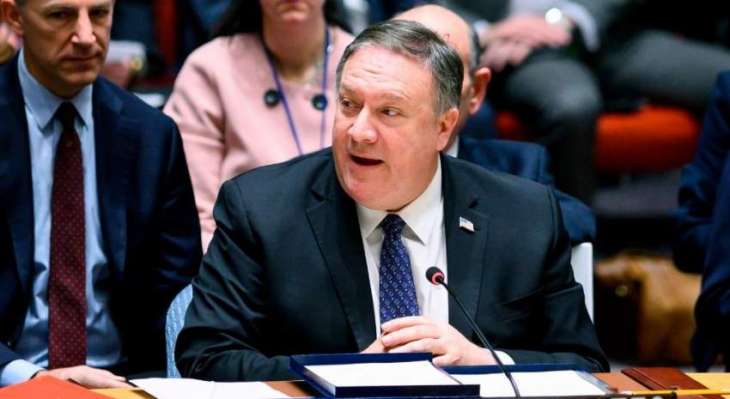New Strategic Arms Reduction Treaty (START) may be at risk if the United States suspends its participation in the Intermediate-Range Nuclear Forces (INF) Treaty, experts told Sputnik
MOSCOW (Pakistan Point News / Sputnik - 01st February, 2019) New Strategic Arms Reduction Treaty (START) may be at risk if the United States suspends its participation in the Intermediate-Range Nuclear Forces (INF) Treaty, experts told Sputnik.According to media reports, Washington is planning to announce the suspension later on Friday. Russia and the United States have had talks on the treaty, but according to Russian Deputy Foreign Minister Sergey Ryabkov, no progress was made.
The United States alleges that Russia's 9M729 missile violates the treaty, which prohibits ground-launched missiles with the range between roughly 311 and 3,317 miles. Russia has refuted the allegations and cited its own concerns over US MK-41 launchers in Europe that might be used to fire Tomahawk medium-range cruise missiles.
New START limits the number of deployed intercontinental ballistic missiles (ICBM) and bombers to 700, nuclear warheads on deployed ICBMs to 1,550, and ICBM launchers to 800. The treaty is set to expire in February 2021 with an option to extend, but Russia could opt for suspension, Dr. Nikolai Sokov, a senior fellow at James Martin Center for Nonproliferation Studies of Middlebury Institute of International Studies at Monterey, told Sputnik.
"Next year Russia will have to make a decision whether it can agree to extend New START ... Russia could choose the same option as the US with INF suspension. In the end, this will mean that two remaining bilateral arms control treaties will no longer be in effect, whether they are officially abrogated or just suspended," Sokov said.
Paul Ingram, the executive director of the British American Security Information Council think tank, believes that the future of New START is of more concern than the suspension of the INF treaty.
"Whilst the future of the Treaty itself is bleak today, there remains hope that any INF arms race in Europe can be avoided. Possibly of more concern is the future of the New START agreement. If there is no follow-on then multiple ... arrangements involving assurance and inspections could come to an end and both sides unrestrained by treaty in their nuclear deployments. This would have a far greater negative impact upon European security and strategic stability," Ingram told Sputnik.
The Russian deputy foreign minister expressed similar concerns earlier on Friday.
"I am really afraid the New START may have the same future as the INF. It may simply expire on February 5, 2021, without being extended," Ryabkov said, as aired on the Rossiya 24 tv channel.
The United States might be open to renegotiation of the INF treaty, according to Dr. M. V. Ramana, the Simons chair in Disarmament, Global and Human Security at the Liu Institute for Global Issues at the University of British Columbia.
"Given [US President] Donald Trump's portrayal of himself as a master of deal-making, I would not be surprised that he would be open to renegotiating the treaty. What amendments the United States would propose is difficult to predict," Ramana told Sputnik.
A clause limiting even the early development of new weapon systems is a possibility, the expert believes.
Miles Pomper, a senior fellow in the Washington DC office of the James Martin Center for Nonproliferation Studies (CNS) of the Middlebury Institute, argues that the United States could only be interested in renegotiating the treaty if Russia 'takes steps to modify or eliminate the 9M729 or conducts independently verifiable flight tests."
"Should it wish to do so, it might consider limiting the treaty to Europe so it can contest China's development of such missiles or technical amendments that would provide a process for preventing disputes like those that are sinking the treaty from doing so in the future," Pomper told Sputnik.
The European Union, which is geographically between the United States and Russia and within range of the missiles that the INF treaty prohibits, has called on both parties to preserve the agreement.
"What we definitely don't want to see is our continent going back to being a battlefield or a place where other superpowers confront themselves. This belongs to a faraway history," EU top diplomat Federica Mogherini said earlier on Friday at a press conference in Bucharest.
Pomper is skeptic about Europe's ability to influence the fate of the treaty.
"Other than urge the United States and Russia to keep talking and trying to resolve the issue, I'm not sure there is much Europeans can do at this point," the expert said.
According to Ramana, the Europeans can issue a joint call for the United States and Russia "to continue to maintain the regime of arms control agreements that has been in place since the end of the Cold War."
"The second [step] is to make it clear that even if the INF treaty is not in place, European countries would not allow the deployment of any new missiles on their soil," Ramana said.
Sokov, in turn, believes that Europe can play an important role in INF treaty negotiations.
"Europe (the EU) and more specifically Germany is the only one that can engage in arms control with Russia not as an independent actor (no agreement is possible without the United States), but at least as an intermediary. It could also work on development of a compromise position that would enable the United States and Russia to come to the negotiating table," the Middlebury Institute scholar said.
Sokov pointed out that this would require "a lot of political courage."




